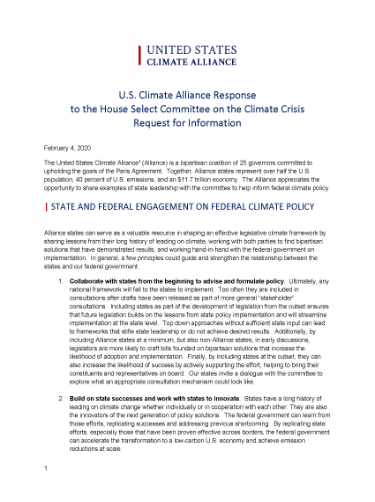Home / U.S. Climate Alliance Details State-Led Climate Action to House Select Committee on the Climate Crisis

The U.S. House of Representatives created the Select Committee on the Climate Crisis to “investigate, study, make findings, and develop recommendations on policies, strategies, and innovations to achieve substantial and permanent reductions in pollution and other activities that contribute to the climate crisis, which will honor our responsibility to be good stewards of the planet for future generations.” The Select Committee has received recommendations from young climate leaders, policy specialists, business leaders, and state and local officials at meetings and hearings held in Washington, D.C. and around the country. To supplement their ongoing work, the Select Committee requested recommendations for what actions Congress can take to address climate change.
Our submission outlines how Alliance states can serve as a valuable resource in shaping an effective legislative climate framework by sharing lessons from their long history of leading on climate, working with both parties to find bipartisan solutions that have demonstrated results, and working hand-in-hand with the federal government on implementation.
Launched on June 1, 2017 by the governors of Washington, New York, and California to help fill the void left by the previous administration’s decision to withdraw the U.S. from the Paris Agreement, the Alliance has grown to include 24 governors from across the U.S. representing approximately 60% of the U.S. economy and 55% of the U.S. population. Governors in the Alliance have pledged to collectively reduce greenhouse gas emissions by at least 26-28% below 2005 levels by 2025, at least 50-52% below 2005 levels by 2030, and collectively achieve overall net-zero greenhouse gas emissions as soon as practicable, and no later than 2050.
The Alliance’s states and territories continue to demonstrate that climate action goes hand-in-hand with economic growth, job creation, and better public health. While reducing emissions by 18% between 2005 and 2021, Alliance members grew their collective GDP by nearly 30%. The coalition’s states and territories are employing more workers in the clean energy sector, achieving lower levels of dangerous air pollutants, and preparing more effectively for climate impacts and executing more pre-disaster planning than the rest of the country.
###